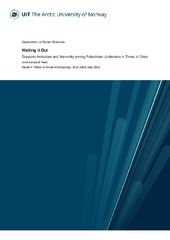Waiting it Out: Diasporic Activation and Normality among Palestinian Jordanians in Times of Crisis
Author
Reed, Jorid AarslandAbstract
This master’s thesis in social anthropology explores how Palestinian refugees living in Amman, Jordan, navigate their sense of national identity alongside the practical demands and opportunities of everyday life, and how political crises, such as the war in Gaza that started in October 2023, can revitalize or intensify this identity. This thesis introduces the concept of diasporic activation to describe how such crises trigger emotional, symbolic, as well as political responses within a diaspora. These responses include visible forms of activism, such as protests and the use of social media, but also more subtle shifts in affect, attention, and sense of belonging.
The theoretical framework is developed through Pierre Bourdieu’s concepts of habitus, field, and doxa and is used to reflect on how identity is practiced and embodied through social space and practice. I also draw on perspectives from Sherry Ortner and Ghassan Hage to emphasize forms of agency and endurance within constrained conditions.
The research is based on thirteen months of ethnographic fieldwork in Amman, conducted over two periods—before and after the outbreak of the war in Gaza. Data was collected from participant-observation and semi-structured interviews with Jordanians of Palestinian descent, mostly residing in West Amman.
The findings reveal a central paradox: even during moments of rupture and political crises, life goes on. People have jobs to do, loved ones to care for, and future plans to attend to, even while emotionally and symbolically engaging with the Palestinian cause. I argue that normality and activation are not opposites, but intertwined processes that play an important role in shaping how identity is lived in exile. Diaspora is not seen as a static condition, but rather as lived, relational, and affective experiences of displacement, formed by both the impacts of ongoing displacement and the ordinary practices of life.
Publisher
UiT The Arctic University of NorwayMetadata
Show full item recordCollections
Copyright 2025 The Author(s)


 English
English norsk
norsk
